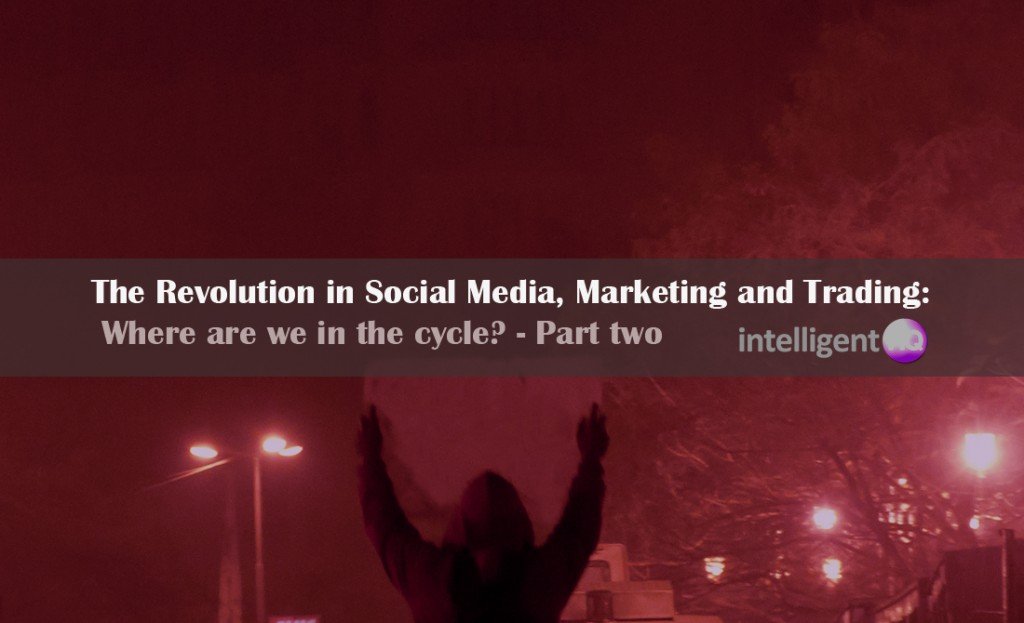In the first part of this article, I have traced the Revolution in Social Media, Marketing and Trading: where are we in the cycle?
Now I would like to consider the use of social media in the financial markets.
1. There has been a revolution of information and social media in the financial industry
In the financial world we are experiencing some mega-trends when it comes to social media. With the increasing volume of information available to traders, there have been various projects aiming to provide faster access to relevant information. In some instance this has been done via algorithms which can tap into the pull of information available, filter it and therefore improve trading performance.
A key milestone in this area was in 2006 when Monitor 110 hit the front page of the Financial Times.
Monitor 110. Image Source: Financial TimesRoger Ehrenberg, the former head of Deutche Bank’s fund of hedge funds launched Monitor 110 with the vision of centralising & turning Internet information into alpha generation for institutional investors.
The basic idea was that the system would act as an aggregator and a filter for hedge funds to get faster access to relevant information. They would have access to information before it became visible to the average investor. This announcement generated great amounts of publicity; however, only one year after its launch the company went out of business. #FAIL
Twitter Arrives to Financial IndustryIn its post-mortem, Roger claimed the reason the project failed was that they had too much PR, too much money and no customer relationships. I believe that there is no such thing as too much PR if the product and service are good; there is no such thing as too much money; and in actual fact Monitor 100 did have valuable customer relationships, in the form of ten hedge funds testing the system. The truth is that Twitter, a more decentralised way of accessing breaking news launched in 2006 and by 2008 it was already getting a lot of traction. However, Twitter did not solve the filtering challenge. Funny enough, it was Roger Ehrenberg who launched TweetDeck a powerful filtering system and later sold it to twitter for 40m USD.
2. Major banks are banning traders from using multi-dealer chat-rooms while the rest of the world is sharing more openly
Global banks such as JP Morgan, Deutsche Bank, Goldman, Citigroup, UBS, have decided to ban traders from using multi-dealer chat functions through fear that such platforms could open the door to market manipulation. Under a new policy, these banks will not allow person-to-person communication over instant-messaging services created by Bloomberg LP, Yahoo Inc., AOL Inc. and other third-party providers.
Banks ban on chats, bloomberg, twitter. Image Source: Uriel AlvaradoThe financial industry seems to be lagging behind when it comes to sharing in social media and even going against the flow when it comes to sharing openly. For the rest of society, there is a move to even greater transparency – today it seems that most people have no secrets and we are becoming accustomed to sharing our pictures, thoughts, profiles, interests and lives openly. We even share our homes (Airbnb).
Finance used to be social, the London Stock Exchange started at a coffee house! Traders used to gather at coffee shops where a list of prices would be presented and they would casually buy and sell commodities and stocks. This has changed and today, in spite of all the technology advances, banking seems to be the last fortress of secrecy.
People have lost faith in advice and research from BanksMoreover, one of the most worrying aspects of the global financial crisis is that many people have lost faith in advice.
Gone are the days when trading decisions were being made based on corporate announcements, print news articles or delayed data emanating from exchanges. We trust our peers and we are making more of our decisions based on their open recommendations. While Twitter is now an agile community where the news break and markets are being discussed, are Twitter users putting their money where their mouth is?
At Saxo Bank, we have embraced social media – we have created TradingFloor.com, a trading platform which we have described as the ‘facebook of trading’ and which we hope will democratise access to trading. We have combined our award winning multi-asset platform with a social trading community of serious investors and believe that this will revolutionise the way people trade.
Imagine a world where finance is open, transparent, social and with decentralised information. Take a look at www.TradingFloor.com
Uriel Alvarado is a highly experienced, senior financial services marketer. In his current role as Chief Marketing and Public Relations Officer, he drives all phases of Marketing, Brand Management and Public Relations strategy for Saxo Capital Markets. He has held numerous senior marketing and PR roles within the Saxo Bank Group including: Global Chief Marketing and Public Relations Officer, ForexTrading, a trade name of FT World Ltd, a fully-owned subsidiary broker in the Saxo Bank Group. Head of Marketing for Iberia and Latin America, where he developed Sala de Inversion, an online trading community. Uriel has diverse experience gained through his studies and work in several countries including Denmark, Mexico, Cyprus, Switzerland, Spain and Japan. He speaks Spanish, Portuguese, Japanese, Danish and English.
Before joining Saxo Bank, Uriel worked as Marketing and Strategy Manager at a business and branding consultancy, design:success, and co-founded a digital creative marketing agency, The Lighthouse.










